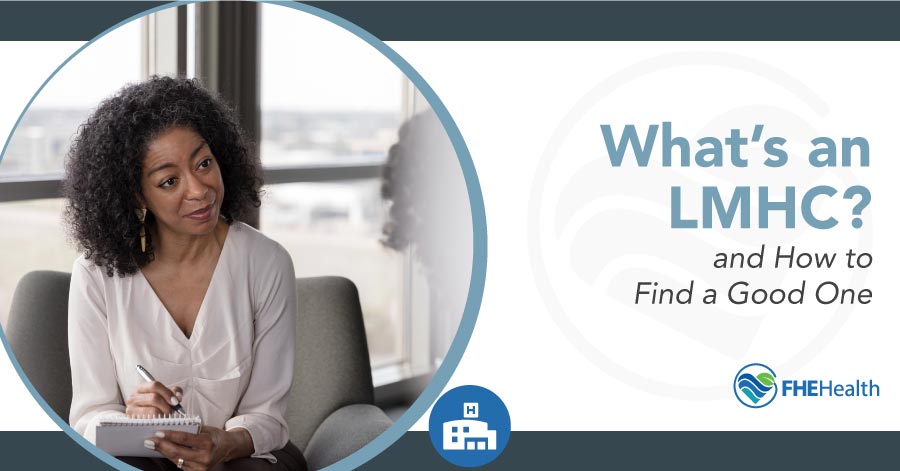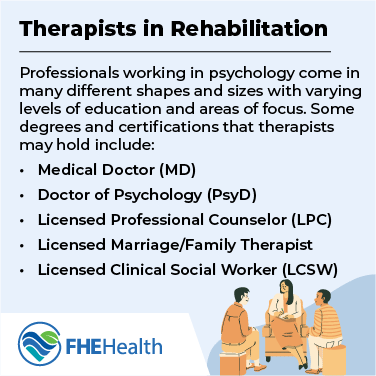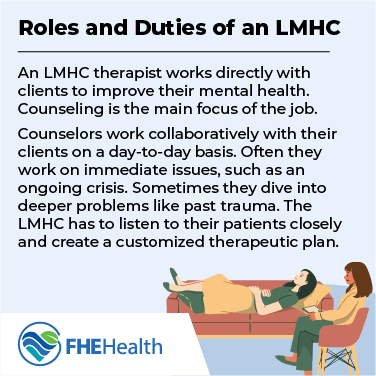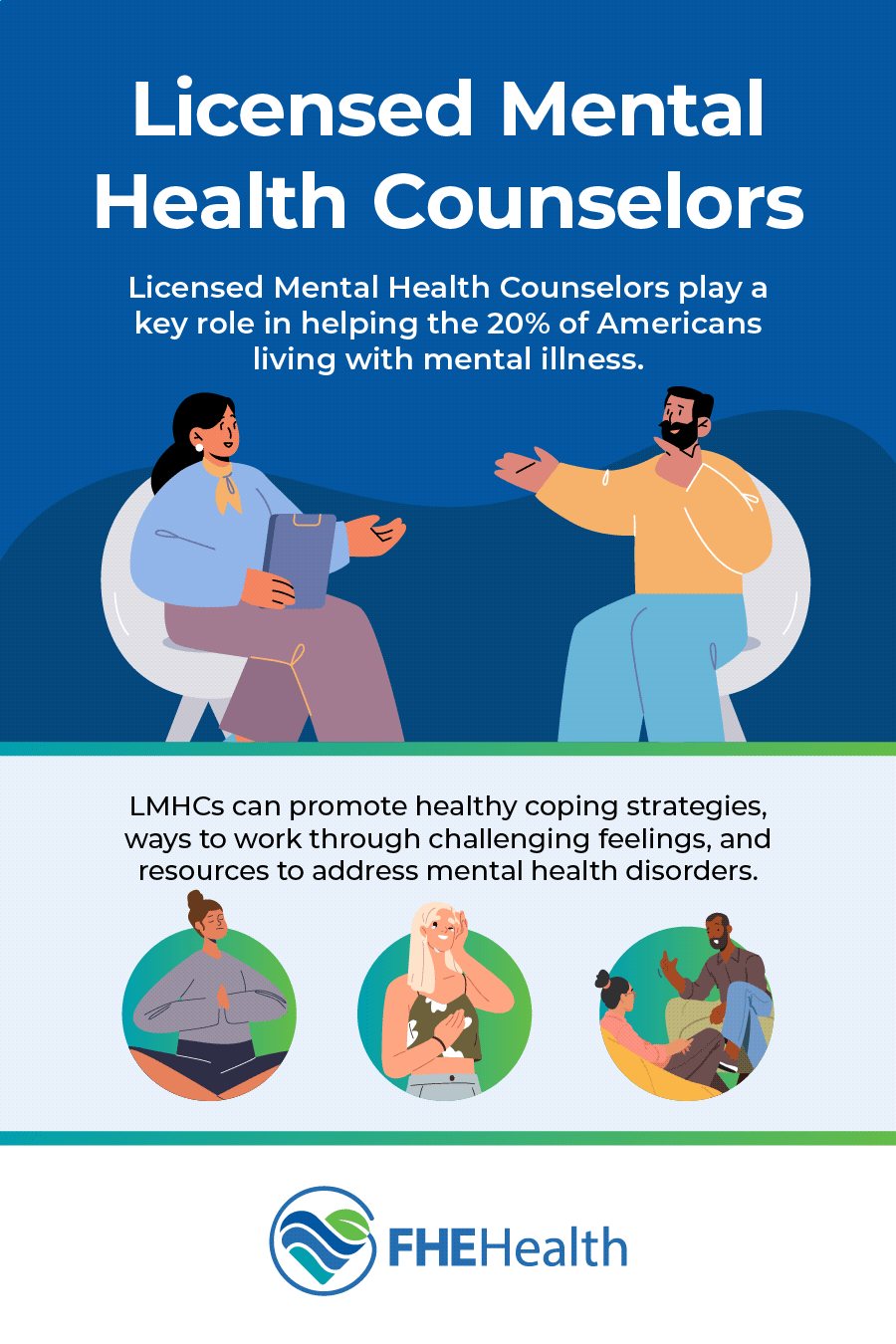
|
|
This article has been reviewed for accuracy by our peer review team which includes clinicians and medical professionals. Learn more about our peer review process.
 Addressing substance use disorders (SUDs) and mental illness can be a challenging process involving many different strategies and forms of professional intervention. From physicians and nurses to mental health professionals, promoting successful recovery can take a village.
Addressing substance use disorders (SUDs) and mental illness can be a challenging process involving many different strategies and forms of professional intervention. From physicians and nurses to mental health professionals, promoting successful recovery can take a village.
In many different treatment programs, Licensed Mental Health Counselors play a key role in helping the 20% of Americans living with mental illness. These mental health experts are usually highly educated and trained to provide actionable resources for their patients. The involvement of LMHCs can promote healthy coping strategies, ways to work through challenging feelings, and resources to address mental health disorders.
Dr. Beau A. Nelson, DBH, LCSW, Chief Clinical Officer at FHE Health, says “research has shown that the relationship between the therapist and the patient is one of the most important factors in having a good experience in therapy. While qualifications and licensure are important, make sure to get a feel for if you feel safe and trust your therapist, do they listen and communicate with you like you like, does it feel helpful to talk to them, that will be important to discern in your first few visits.”
The Role of Therapists in Rehabilitation
 In comprehensive treatment programs, therapy, both group and individual, plays a significant role. Therapists work in both inpatient and outpatient capacities, striving to help patients identify issues and work through them in a safe, healthy way.
In comprehensive treatment programs, therapy, both group and individual, plays a significant role. Therapists work in both inpatient and outpatient capacities, striving to help patients identify issues and work through them in a safe, healthy way.
However, “therapist” is a blanket term that describes a field of practice rather than a single profession. Professionals working in psychology come in many different shapes and sizes with varying levels of education and areas of focus. Some degrees and certifications that therapists may hold include:
- Medical Doctor (MD): Psychiatrists are fully licensed and trained physicians who complete a minimum three-year residency program in psychiatry following medical school. While many psychiatrists do practice forms of talk therapy, others are more focused on the use of medications. Psychiatrists are the only form of mental health professional with the ability to write prescriptions.
- Doctor of Psychology (PsyD): PsyDs are psychologists with doctorate degrees in psychology. However, this accreditation doesn’t necessarily indicate a particular field of practice. Some PsyDs practice in forensic psychology, while others work in a research capacities. PsyDs can hold other forms of licensure but are not required to do so.
- Licensed Professional Counselor (LPC): The Licensed Professional Counselor group encompasses many different forms of licensed mental health professionals as licensure options vary greatly from one state to another. LPC certifications include: Licensed Mental Health Counselor (LMHC), Licensed Clinical Professional Counselor (LCPC), Licensed Professional Clinical Counselor (LPCC), and Licensed Clinical Mental Health Counselor (LCMHC). Regardless of specific acronym, these practitioners generally must hold at least a master’s degree in a counseling field and achieve passing scores on a licensing exam. Most LPC certifications also require anywhere from 1,000 to 3,000 hours of training before being permitted to practice independently.
- Licensed Marriage/Family Therapist: In some states, separate credentialing options are available for those who specialize in family or marriage counseling. Educational requirements are similar to those required of a Licensed Professional Counselor but may also be less.
- Licensed Clinical Social Worker (LCSW): Social work is a different field from counseling but often operates in an adjacent manner. Many social workers actively counsel clients, especially those who have legal or family issues related to mental health or addiction. LCSWs must have a degree in social work and meet exam and practice hour requirements.
What is a Licensed Mental Health Counselor?
 LMHC Meaning
LMHC Meaning
LMHC stands for Licensed Mental Health Counselor and is the designation for LPCs in Florida and six other states. An LMHC therapist has to have a master’s degree in an approved program, two or more years of supervised experience, a passing score on the National Mental Health Counseling Examination (NCMHCE) and additional training on Florida-specific requirements.
The training and education for LMHCs covers all types of mental health counseling, making them adaptable and knowledgeable therapists. There’s a high standard for this position, and it takes a lot of work to obtain. While some specialize in a certain type of psychotherapy, others use a broad approach and adapt to specific clients.
In Florida, the minimum requirements to become an LMHC include:
- A master’s degree in an approved counseling program that includes at least 80 semester hours or 60 quarter hours of related coursework
- At least two years of supervised experience after completing a qualifying degree program, which must include 100 hours of supervision and 1,500 hours of face-to-face counseling with patients
- A passing score on the National Clinical Mental Health Counseling Examination (NCMHCE)
- Additional coursework, including an eight-hour review of Florida laws and rules, three hours of HIV/AIDS training, and two hours of domestic violence training
To become an LMHC, students must master many different topics within counseling, ranging from family therapy to addiction treatments. In both addiction and mental health treatment programs, LMHC is the gold standard. The NCMHCE is thorough and complex, ensuring only those with the expertise and knowledge to succeed are granted this certification.
What Are the Roles and Duties of an LMHC?
An LMHC therapist works directly with clients to improve their mental health. Counseling is the main focus of the job. Some work with a variety of patients, while others have specializations. They might focus on a specific population, mental health issue or method of therapy. You can tailor this job to the psychotherapy that interests you most.
Counselors work collaboratively with their clients on a day-to-day basis. They aim to build a trusted relationship and encourage clients to open up to them. Often they work on immediate issues, such as an ongoing crisis. Sometimes they dive into deeper problems like past trauma. The LMHC has to listen to their patients closely and create a customized therapeutic plan for them.
What Is Certification Like for an LMHC?
Florida has specific education and licensing requirements for LMHCs. Some may not be required if you’re already licensed in another state or country, depending on their requirements.
Master’s Degree
LMHCs need a minimum of a master’s degree in mental health counseling or a related field from an accredited institution. They must have at least 60 semester or 80 quarter hours. There are also required courses that vary depending on if your school is accredited by the Council for the Accreditation of Counseling and Related Educational Programs (CACREP).
Supervised Experience
After completion of a master’s degree, at least two years of supervised experience is required for LMHCs. They need to include at least 100 hours of supervision, 1,500 hours of face-to-face therapy work with clients and at least one hour of supervision every two weeks.
NCMHCE Exam
LMHCs in Florida must receive a passing grade on the NCMHCE exam. It’s a test developed by the National Board for Certified Counselors (NBCC) to determine practical skills.
Additional Training
Florida requires a two-hour domestic violence course, an eight-hour laws and rules course and a three-hour HIV/AIDS course.
What Jobs Can I Get as an LMHC Therapist?
LMHCs can work in a wide variety of counseling jobs. You can work for a practice or open your own. The following is just a small sample of possible careers.
- Marriage or divorce counseling
- Family therapy
- Addiction therapist
- Behavioral counselor
- School therapist
- Social worker
- Psychodynamic therapist
- Clinical psychology professor
Is an LMHC a Good Job?
According to the U.S. Bureau of Labor Statistics (BLS), the employment of behavioral disorder, mental health and substance abuse counselors is projected to grow 22% between 2021 and 2031. This is higher than the average for all other occupations. Growing awareness and work to destigmatize mental health treatment is leading more people to seek counseling. States are also sending more offenders to mental health treatment rather than jail.
The BLS put the median salary for an LMHC in 2021 at $48,520 per year. However, it groups several types of counselors together, including those who only need a bachelor’s degree. LMHCs may earn more since they have more qualifications and licensing. Salary can vary with qualifications, location, type of work and hours. The top-paying states for licensed mental health counselors have median salaries between $63,000 and $66,000 annually. Those states are Utah, Alaska, Rhode Island, New Jersey and the District of Columbia.
Assuming the salary fits your needs, this is a good field to get into. It’s only expected to grow, and you’ll have the flexibility to choose any type of counseling you enjoy and work nearly anywhere.
How to Find the Right LMHC as a Patient
Finding the right counselor to address issues of any kind can be a long process, and calling the first name in the phone book generally isn’t a good plan of action. Instead, patients are encouraged to research the different counseling certifications and degrees, kinds of training programs, and various licensure requirements.
When evaluating counselors, be sure to also consider past history. For example, a counselor experienced in juvenile counseling may not be as well qualified to address addiction issues. Those searching for counselors or treatment facilities are encouraged to read reviews, explore areas of expertise, and consider counseling history to ensure the right fit.
Personality can also be a factor to consider; not all counselors will mesh with all patients. Counseling functions best when patients trust their therapist and are willing to speak openly and candidly. When patients have a hard time opening up or being honest, the effectiveness of treatment may suffer.
If one counselor isn’t the right fit, patients should look into other options and explore different paths for treatment. What works for one person won’t work for everyone.
How LMHCs Can Help
The training to become a Licensed Mental Health Counselor is expansive, covering techniques across many different fields. As such, LMHCs are prepared to address many different life circumstances, including family problems, mental illness, addiction, sexual orientation and identity, death and grief, and any other form of life struggles.
During education, test preparation, and practical experience, LMHCs learn many different approaches to therapy, including:
- Cognitive behavioural therapy (CBT)
- Dialectic behaviour therapy (DBT)
- Psychodynamic therapy
- Humanistic therapy
- Eye Movement Desensitization and Reprocessing (EDMR)
- Group therapy
By using their professional training to assess patients, counselors can determine the right way to approach therapy in order to meet goals and maximize therapeutic progress. Should treatment not progress as expected, counselors have the knowledge and expertise necessary to change therapeutic plans as necessary.
The Importance of Counseling in Treatment
Best practices for addressing both mental health issues and SUDs rely on working with the right resources. A great counselor can make an enormous difference in patient outcomes, regardless of the root cause of challenges.
FHE Health is a leader in treatment for both mental illness and addiction, including co-occurring conditions. Staff members include doctors, nurses, and expert LMHCs with the ability to provide qualified care based individual needs. Patients are evaluated and treated in both group and individual settings to address everything from coping strategies to ways to confront personal struggles.
Contact FHE Health today to learn more about how experienced and educated professionals can make a difference in the step-down treatment process, as well as how LMHCs function within mental health and addiction rehabilitation programs.









